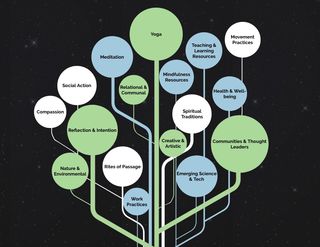Mindfulness, meditation and health your own way

Guest blogger Jeff Genung is co-founder and President of Contemplative Life http://contemplativelife.org, a non-profit technology company that helps connect people and communities with transformative practices. He serves on the board of The Center for Contemplative Mind in Society, http://www.contemplativemind.org ,a pioneer in bringing contemplative pedagogy to higher education.
Have you ever wanted to develop a daily practice such as meditation but don’t know where to begin? Now that the mindfulness movement has entered the mainstream, we are seeing more articles advocating the benefits of practice in virtually every aspect of society. Universities and medical centers are studying the effects of contemplative practices on health and wellbeing. There is a growing body of scientific research documenting the benefits of practices such as meditation and mindfulness. The list of benefits is impressive and includes the following:
Treat ADHD, addiction, high blood pressure, eating disorders, fibromyalgia, and heart conditions
Increase creativity, memory and empathy, healing from anxiety, depression, and chronic pain
Many people now associate the benefits of having a daily practice to the benefits of eating a healthy diet and having regular exercise. It intuitively seems like a useful thing to have in our stress-filled lives. Similarly, few people go from thinking that practice is a good idea to having a daily practice. It’s a process. However, when it comes to practice there is no panacea or “one size fits all”. There are thousands of practices available to meet each person’s individual needs. The right and perfect practice exists for everyone. The main question is what practice is right for me and my individual needs and lifestyle?
Today we are hearing a lot about practices such as mindfulness, meditation and yoga. However, these are just a few of the myriads of contemplative practices that are available. Contemplative practices have to do with cultivating the inner life. As human beings, we all have an inner life and an outer experience. Consequently, everyone is contemplative in their own unique way and the right and perfect practice for a person often differs depending on how each person is “wired”. For instance, are you a head, heart or hands person? Are you in crisis or is your life in flow? Are you young or old? Do you have any health conditions? What is your cultural, educational and spiritual background? All these things and more can impact what the right practice might be for a you at a particular point in life’s journey.
The modern mindfulness movement has been paved by the growing interest in meditation and yoga. The original framework for modern day mindfulness has its roots in Buddhism but has been rearticulated using a contemporary idiom, thereby removing overtly religious and spiritual terms and language. Consequently, mindfulness, meditation and yoga have successfully pierced the traditional veil of public and private organizations that have traditionally had barriers to such practices.
However, these practices are only a few of the many practices that fall under the overarching term of contemplative practice. These are practices that help cultivate and ultimately transform the inner life, bringing balance, wholeness and wellbeing to both the inner life and outer experience. Cultivating an authentic and meaningful contemplative life can come from formal practices such as meditation but can also come from experiences with nature, art, music, poetry, relationships and many other things. Everyone is contemplative but not everyone relates to formal practices such as mindfulness and yoga.
Living a contemplative lifestyle is something that intersects all aspects of human life and activity. This includes work and professional life, as well as our social and family life. Consequently, the practices and activities associated with contemplative experience takes on a variety of forms that differs widely among people.
A new digital hub called Contemplative Life has recently been created to help solve this problem. It serves as a digital hub that brings myriads of different practices and communities under one umbrella to help connect people and communities with transformative practices. Also, if you are interested in mindfulness you can learn more about an upcoming mindfulness training that is available through Contemplative Life.About the Author


Comments